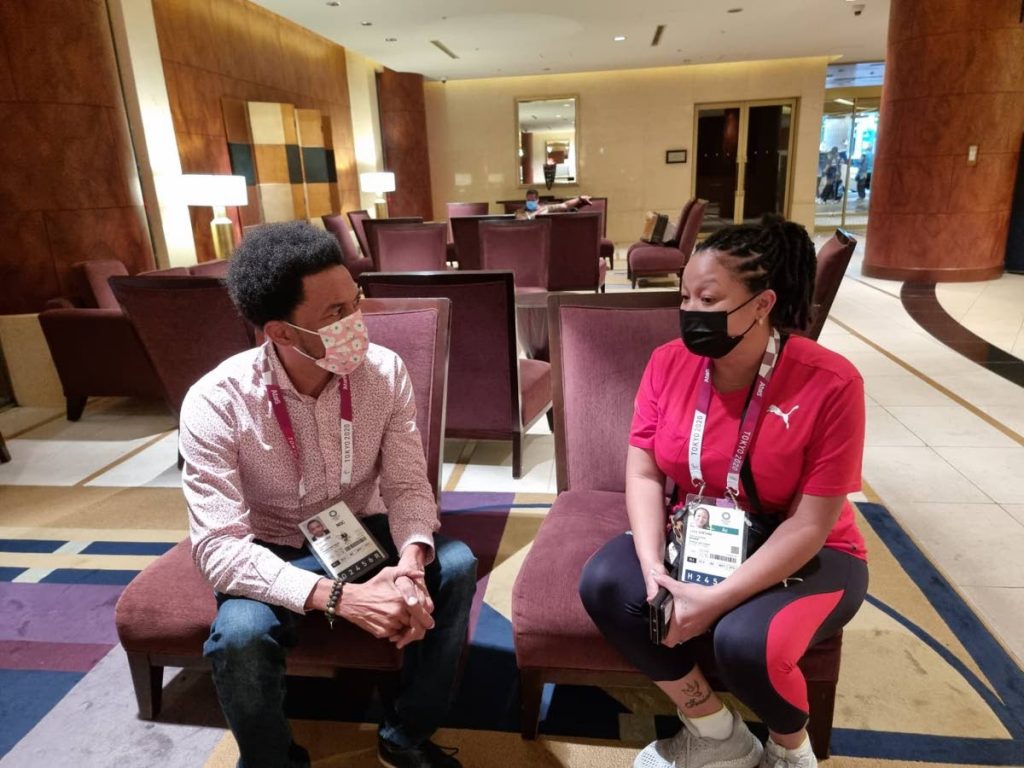IF ANY remaining member of Trinidad and Tobago’s Olympic delegation in Japan tests positive for covid19 before departure on the final day on Sunday, and must undergo mandatory quarantine owing to Japan’s government regulations, TT Olympic Committee (TTOC) president Brian Lewis will postpone his return home until the athlete/s is/are allowed to leave.
The majority of TT’s delegation have already exited Japan since all nations were given a two-day window to leave upon completion of their respective events.
Still in Japan from Team TTO are Lewis, national cyclists Nicholas Paul and Kwesi Browne, a few members of the men’s 4x400m relay team and a couple officials.
Paul, Browne and the relay team (Deon Lendore, Jereem Richards, Dwight St Hillaire and Machel Cedenio) concluded their Olympic campaign on Saturday.
To leave Japan, delegation members must submit a negative nasal PCR test within 72 hours of departure. If a member tests positive for coronavirus, they will be required to spend approximately ten days in quarantine there.
They will only be allowed to depart after submitting a negative test at the end of their quarantine duration. So far, no TT member has returned a positive test before leaving.
On July 30, the TTOC said in a statement that national long jumper Andwuelle Wright, 400m hurdler Sparkle McKnight and long jump coach Wendell Williams tested positive for the virus and were in quarantine at an approved isolation hotel facility. Wright and McKnight were unable to compete at the Games as a result.
Lewis said the trio has completed Japan’s threshold of ten days quarantine and show no symptoms of sickness. According to him, Japan’s public health authorities believe that if they show no signs of sickness after the ten days, the risk of those individuals infecting people are next to zero.
“After discussions with TTOC secretary general Annette Knott, chef de mission Lovie Santana and covid19 liaison officer Rheeza Grant, I put my hand up (to stay back)," said Lewis. "It is what was necessary because I do not want to leave any athlete here.
“The TTOC has a responsibility. I would like, like everybody else, to be back home but if we have to leave any athlete because the Japan government’s procedure, then I will stay back,” he said.
With the closing ceremony scheduled to begin at 7 am (TT time) on Sunday, Lewis credited the Japan government, Tokyo metropolitan government, Tokyo 2020 organising committee and the International Olympic Committee for hosting a successful Games amid the pandemic.
Altogether, there were 206 nations, territories and principalities and 10,305 (excluding officials) athletes competing at the Games. Up until Thursday, Lewis said there were just over 300 positive cases (including officials) recorded at the varying Olympic venues and hotels.
He credited the Olympic bubble system which ensured delegation members were limited to their respective venues and hotels only and had no contact with anyone outside of the bio-secure zone.
Tokyo is still under a state of emergency owing to surging covid19 cases. The Games may have been held in a super spreader city but the stringent countermeasures implemented by organisers seemed to have been a success.
Lewis also said that a handful of Games-related personnel had their accreditation permanently revoked as a result of breaking the strict covid19 protocol. He applauded the measures put in place.
“To enter Japan, we had to take two covid19 tests within 96 hours of your flight departure from wherever you were coming from. You had to take another test on arrival and still quarantine for three days. The containment measures seem to have worked.
“We were all required to do daily saliva tests within the time spent here. Athletes were supposed to leave within 48 hours of their end of competition. The decision to ban spectators both foreign and local and was a critical decision.
“We can only use transportation dedicated for the Olympics and can only spend time with people on a pre-submitted list of contacts,” he added.
Amid the many global pre-Olympic challenges, Lewis, who also serves as president of the Caribbean Association of National Olympic Committees (CANOC) said that all participating athletes must be commended for their participation at the “covid19 Games”.
The pandemic affected training schedules, travel plans, took a mental toll on Olympic stakeholders and forced attendees to adapt quickly to a new environment.
Before the Games kicked off, many scientists and international media warned that the Olympics could create major clusters that could spread to the Tokyo population. Lewis acknowledged the efforts of organisers with just one day to go before the Games conclude.
The temperature in Japan also played an integral role particularly with those participating in outdoor sports.
He said, “It has been extremely hot but it was always going to be. I’ve been in the Olympic Stadium for track and field and you’re seeing the stadium’s temperature monitor reading 38 and 39 degrees Celsius on occasions. They have taken certain heat measures but it’s been hot.”
Lewis concluded, “At this level, you have to be able to zone out the distractions. It has been a huge learning curve for Team TTO athletes and all others. With the highly infectious delta variant spreading on Tokyo and around the world, there’s no room for complacency.”
Source: https://newsday.co.tt

